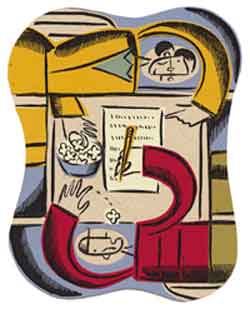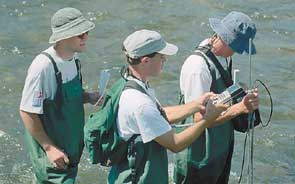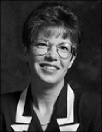By Spencer Rogers
Often the first thing that nabs casual passers-by is the scent of fresh popcorn. Those tempted to sniff inside this cozy nook of the Heber J. Grant Building might notice the air popper resting beside a pair of pen-handling students hunched over a paper in an intense tutoring session. In the corner, next to the ceramic cookie jar, someone taps at the computer, filling the screen word by word. Wedding announcements, inspirational quotes, and flyers for poetry contests and seminars litter one wall. And above the clutter a yellow sign preaches, “Our job is to produce better writers, not better writing.”
The Writing Fellows, the undergraduate students who win these writing contests and pop this corn and eat these cookies, aren’t all English majors; they’re political scientists, musicians, economists, chemists. Their purpose, according to program pioneer Dierdre Paulsen, is to support student writing in all departments across campus.
Since 1993, when Paulsen hired BYU’s first 12 Writing Fellows, the program has swelled to include 56 fellows in 17 courses, tutoring some 700 students. And the future looks bright, judging by the demand for Writing Fellows. “We could grow enormously,” says Elizabeth Hedengren, the current program director. “We already have many more professors that want to work with us than we have funds for.”
“Fellowing,” as the jargon dubs it, is based on a relatively simple concept. Hedengren explains: “Rather than having peer tutors that are based in a central location on campus like the Writing Center, the Writing Fellows are peer writing consultants that are assigned to certain classes in any discipline across campus.”
“We try to match the skills of the tutors–their majors and interests–with the discipline of the class they’re fellowing,” Hedengren adds. “So we can put a physics major in to fellow a physics class, which has an obvious advantage–they understand the material.”
Once farmed out to their respective courses, the fellows read and critique papers from between 12 and 15 students. Then they meet with the students and discuss the papers in a series of half-hour, one-on-one conferences. In addition, Writing Fellows meet regularly with their supervising professor.
Associate professor of physics Jean-François Van Huele points out that since the Writing Fellows process requires early deadlines for drafts and student-tutor conferences, papers aren’t produced the night before they’re due. “Everyone takes the writing more seriously,” he says. And that leads to “a very definite improvement in student writing.”
Rachel Rich, a junior majoring in English, was tutored by a Writing Fellow in her history of civilization class. “I thought I had a pretty decent paper when I came in,” she says of her initial experience. “But my fellow challenged me and helped me take my writing to the next level.” The semester was so positive that Rich later applied to and joined the Writing Fellows herself.
Fellows, then, begin with writing talent, a working knowledge of the class subject matter, an idea of what the professor looks for in student writing, a few tutoring techniques, and a mission: to help their students write effectively in a particular academic field.
But the end result, they hope, won’t just be one or two grammatically correct papers; ideally, their students will have made permanent strides toward better writing.
Sure, Writing Fellows wade through a lot of work and worry, but they do have their fun. Hedengren– “Auntie Beth,” as her students call her–has made an effort to design a round, diverse experience, ranging from firesides and socials to community service. The service is a requirement of the fellows’ section of Honors 303R, a course that aims to develop writing and tutoring skills in new fellows. For the course, Writing Fellows export their talent and enthusiasm to local high schools, community care centers, other students, writing classes, and more.
Hedengren emphasizes that the program is service oriented. Though the fellows are rewarded with a small monetary compensation, “it’s not the kind of thing where you clock in and clock out. You just contract to do what needs to be done.”









